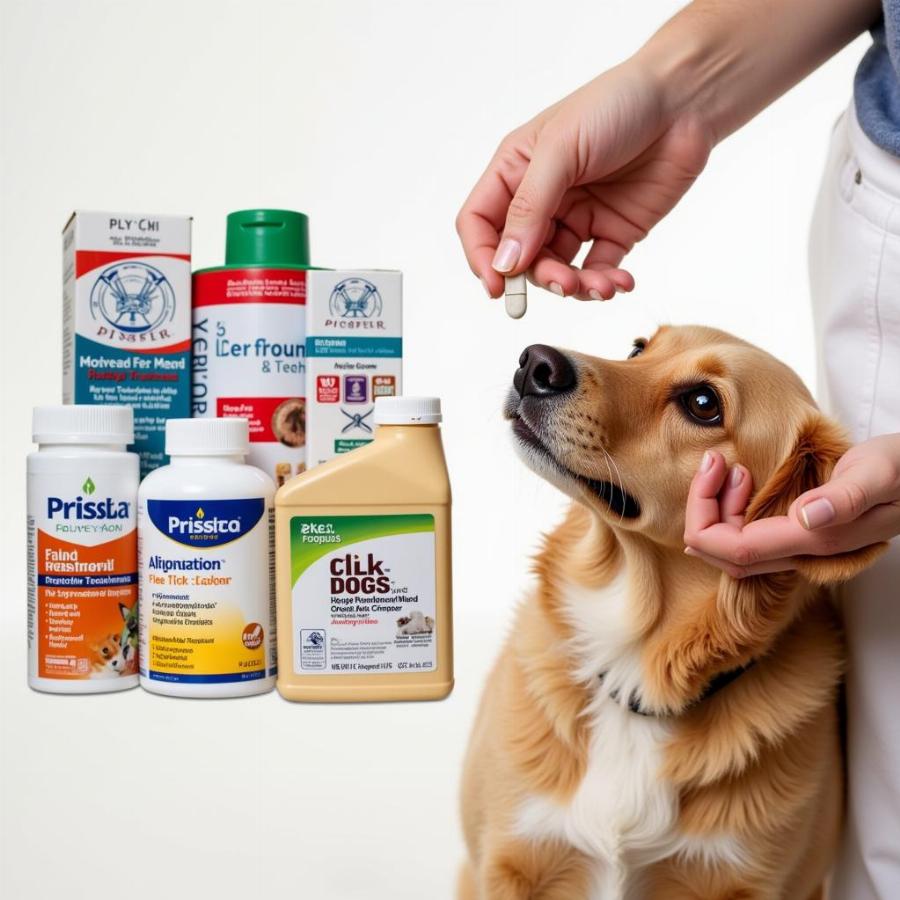Flea and tick pills for dogs are a crucial part of pet ownership, offering a convenient and effective way to protect your furry friend from these pesky parasites. Choosing the right flea and tick pill can be overwhelming with so many options available. This guide will help you navigate the world of flea and tick prevention, ensuring your dog stays healthy and parasite-free.
Understanding the Importance of Flea and Tick Prevention
Fleas and ticks are more than just a nuisance; they can transmit serious diseases to your dog, like Lyme disease, ehrlichiosis, and anaplasmosis. These tiny parasites can also cause skin irritation, allergies, and even anemia in severe infestations. Preventing these parasites is much easier and less costly than treating the diseases they can carry.
Why Choose Flea and Tick Pills?
Flea and tick pills offer several advantages over other preventative methods like topical treatments or collars. They are easy to administer, generally long-lasting (typically a month), and highly effective. Plus, they’re often less messy than topical treatments and less likely to be removed by your dog than a collar.
 Choosing Effective Flea and Tick Medication for Dogs
Choosing Effective Flea and Tick Medication for Dogs
Navigating the Different Types of Flea and Tick Pills for Dogs
There are several types of flea and tick pills available, each with its own active ingredients and mode of action. Some target only adult fleas and ticks, while others also disrupt the parasite life cycle by preventing eggs and larvae from developing. It’s crucial to understand these differences to choose the best option for your dog.
Common Active Ingredients in Flea and Tick Pills
Some common active ingredients you’ll find in flea and tick pills include:
- Afoxolaner: Kills adult fleas and ticks rapidly and provides month-long protection.
- Fluralaner: Provides fast-acting and long-lasting protection against fleas and ticks.
- Nitenpyram: Primarily kills adult fleas, providing quick relief from infestations.
- Sarolaner: Effective against both fleas and ticks, offering month-long protection.
Choosing the Right Pill for Your Dog
Factors to consider when choosing a flea and tick pill for your dog include:
- Age and weight: Pills are formulated for specific weight ranges, ensuring the correct dosage.
- Lifestyle: Consider your dog’s environment and exposure to parasites.
- Health conditions: Consult your veterinarian if your dog has any underlying health issues.
- Other pets in the household: Some pills also protect against heartworm, which can be transmitted by mosquitoes.
Administering Flea and Tick Pills Safely and Effectively
While flea and tick pills are generally safe, it’s essential to follow the instructions carefully. Always administer the pill with food to minimize the risk of stomach upset.
What to Do If Your Dog Vomits After Taking a Pill
If your dog vomits shortly after taking the pill, contact your veterinarian for advice. They may recommend re-dosing or suggest an alternative preventative method.
Are There Side Effects of Flea and Tick Pills?
While generally safe, some dogs may experience mild side effects like vomiting, diarrhea, or lethargy. These are usually temporary and resolve on their own.
When to Contact Your Veterinarian
If you notice any unusual symptoms after giving your dog a flea and tick pill, contact your veterinarian immediately.
Beyond Pills: A Holistic Approach to Flea and Tick Prevention
While flea and tick pills are an excellent preventative measure, a holistic approach is often the most effective. This can include regular grooming, checking for ticks after outdoor adventures, and treating your home and yard for fleas and ticks.
Conclusion
Flea and tick pills for dogs are a valuable tool in protecting your pet from these harmful parasites. By understanding the different types of pills available and choosing the right one for your dog’s specific needs, you can ensure they stay healthy and parasite-free. Remember to always consult your veterinarian before starting any new flea and tick preventative.
FAQ
- How often should I give my dog a flea and tick pill? Most flea and tick pills are administered monthly.
- Can I use flea and tick pills on puppies? Yes, but make sure to choose a pill formulated for puppies.
- What if my dog misses a dose? Give the missed dose as soon as you remember and resume the regular schedule.
- Are flea and tick pills safe for pregnant or lactating dogs? Consult your veterinarian before using any flea and tick preventative on pregnant or lactating dogs.
- Can I use a human flea and tick medication on my dog? No, never use human flea and tick medication on your dog. They contain different ingredients and can be toxic to pets.
- What should I do if my dog has a flea infestation despite using pills? Consult your veterinarian. They may recommend a different pill or additional preventative measures.
- Can flea and tick pills prevent all tick-borne diseases? While they significantly reduce the risk, no preventative method is 100% effective.
Related Articles on Beaut Dogs
- best flea pills for dogs without a vet prescription
- flea and tick repellent for dogs
- dog flea treatment small dogs
- why is my dog licking the carpet
- is black pepper harmful to dogs
Beaut Dogs is your trusted source for all things dog-related, providing valuable information and resources for dog owners. We offer expert advice on various aspects of dog care, from choosing the right breed to ensuring their health and well-being. For any questions or concerns, please email us at [email protected] for detailed and accurate assistance. Visit https://beautdogs.com today to learn more!